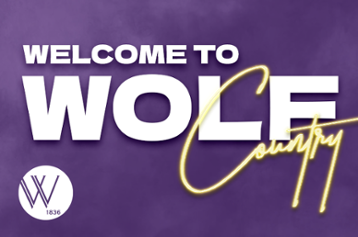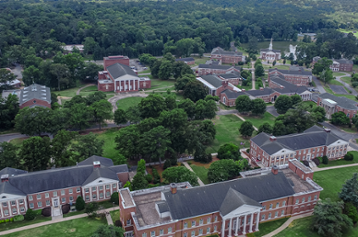Wesleyan College offers a clear path for post graduate outcomes for students in pre-professional programs that include allied health (eg., physical therapy), athletic training, dentistry, law, medicine, pharmacy, Seminary, and veterinary medicine.
Professional schools generally require either completion of an undergraduate major or, in the case of dual degree programs, specific coursework which permits entry into the partner institution’s program.
The pre-professional programs below include a selection of common professional fields; please note that these are not majors. Major in whatever interests you most and pursue one of these careers. Many professional schools require a number of credit hours in a particular academic area (for instance, dental schools require a great deal of biology, chemistry, and math), so earning at least a minor in a related field, in addition to a major in another field, is quite attainable. Students who pursue pre-professional outcomes need to be successful in their approach to undergraduate coursework, attaining a competitive GPA (minimum 3.5 for most professional schools) prior to submitting applications, generally in the summer or fall of their senior year.
Please note that the dual degree timeline for Mercer Law 3 + 3 program. In addition to minimum GPA requirements, professional schools require competitive scores on standardized tests (eg., LSAT for law school) for admission. Applications may be further strengthened by engaging in career-related internships, undergraduate research, volunteer work, and extracurricular activities.
You need to be well informed and organized. It is your responsibility to make sure that all your materials reach the program well before the application deadline. The best thing you can do for your application is to apply early. Advisors will help you, but you should learn as much as possible about the application process and requirements in order to maximize your chances of a successful outcome. Please keep in mind that entrance into professional schools is extremely competitive and not guaranteed; persistence and having a parallel career plan is essential. The 3 + 3 law dual degree program requirements and timelines is located after the pre-professional program descriptions in this guide.
In addition to faculty advisors, the Wesleyan College Center for Career Development is a valuable resource, particularly for experiential learning (internship) opportunities.
Most graduate schools require that you take a standardized test (MCAT, LSAT, GRE, etc.) and that you send in your scores as part of your application. Students in many pre-professional tracks should take any required standardized tests in the spring of their junior year. However, the exact timeline of when you take the test varies depending on when your graduate school applications are due and on when the tests are offered. Check with the testing agency and with your graduate schools to see which test they require, and their final deadline for receiving the scores. Note that it takes some time for the testing agency to send your scores to the schools.
A rolling admissions system means that admissions committees review applications and admit candidates as the applications are received. Graduate schools that do not use rolling admissions wait to review all applications until the deadline, and then admit applicants from the whole pool. If the schools you are applying to use a rolling admissions process, you are strongly advised to submit your application as early as possible after the application cycle opens. This gives you the best chance at admission and financial aid.
Most graduate schools require that you submit academic transcripts from every school you have attended. Wesleyan's registrar’s office (Tate Hall) processes all official transcript requests. You can download free unofficial copies of your transcripts from the Portal. Make sure to check whether your schools want official or unofficial transcripts.
Many tests offer fee reimbursement options for students who qualify. Check the “fees” section of each test website to find more information, and contact the Center for Career Development if you need help requesting the appropriate waiver.
You may find that some internships or research programs offer limited funding for international students, or may not accept international students at all. However, many Wesleyan international students have completed internships and research with Wesleyan professors, with on-campus departments, with Wesleyan alumnae in their field, with private organizations, or with other university professors through an independent research experience. The Center for Career Development can provide additional resources, as well as an updated list of sites that have hosted international students in the past.
If you are an international student completing an internship or research experience, you must first 1) apply for and receive CPT authorization and 2) be registered for either the PDE 400 course or the 452 internship course in your major while completing your experience. These requirements ensure that you stay in compliance with your visa. Talk to the Center for Career Development as soon as you know you’re planning to complete an internship or research, and the CCD will walk you through that process.
When you apply for graduate school, you might be required to take the Test of English as a Foreign Language (TOEFL) and submit your scores. Make sure you know your schools’ requirements for this.
Setting your sights on a career in a professional field such as law, medicine, dentistry, veterinary medicine, or pharmacy is a challenging, but attainable, goal. The stark reality, however, is that not all applicants to these highly competitive programs are accepted. In addition, students often change their career goals as they learn more about the professional field or as they gain experiences that expose them to other career options. For these reasons, parallel planning is an essential part of your professional preparation.
* Adapted from www.cco.purdue.edu

Wesleyan College is privileged to steward many arts and cultural events and share them with the community. Most are free and open to the public. Wesleyan art galleries are open M-F 1-5PM and on Wesleyan Market Saturdays from 10AM-2PM.
Event listing
Wesleyan College is home to five NCAA Division III sports: soccer, basketball, volleyball, tennis, and softball. In addition, we offer an award-winning Intercollegiate Horse Show Association (IHSA) Equestrian program.
View More
Tour our beautiful 200-acre campus featuring Georgian architecture, lush green spaces, recreational facilities, residence halls, and worship center.
Vist Wesleyan Virtually